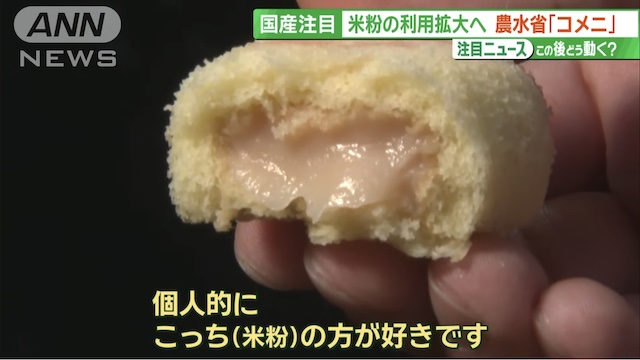TOKYO, May 05 (News On Japan) - Amid global wheat shortages due to abnormal weather conditions and the depreciation of the yen, Japan is seeing price hikes and suspensions in the sale of products like orange juice, leading some to turn to domestic alternatives like mandarin juice. One such alternative gaining attention as a substitute for imported goods is rice flour.

In this report, we follow the "Rice Flour Sales Team" of the Ministry of Agriculture, Forestry and Fisheries.
What are the limitless possibilities of rice flour?
Record Number of Bakeries Going Bankrupt Due to High Wheat Prices Director Hiroaki Yamada says, "Amid a growing trend towards domestic food products, rice flour, which uses rice during the planting season, is drawing attention." Against the backdrop of the situation in Ukraine and the depreciating yen, imported wheat prices continue to rise. Last fiscal year, the number of bakery bankruptcies reached a record high, with the impact spreading widely. Given this situation, rice flour has garnered attention as an alternative to wheat flour. While the demand for rice as a staple food decreases annually, interest in gluten-free ingredients is growing, leading to an increasing demand for rice flour."We're the Rice Flour Sales Team" - "Komeni"
The Ministry of Agriculture, Forestry and Fisheries launched a project team to promote the use of domestically produced rice flour. The team, consisting of 11 enthusiastic employees, conducts sales activities suggesting rice flour usage to companies. The team's friendly name is "Rice Flour Sales Section 2, Komeni," inspired by a popular TV drama. The team’s impactful name seems to have resonated quickly. Eriko Nakajima, the head of "Komeni," notes, "With wheat prices rising each year, the price gap between rice flour and wheat flour is narrowing. This has increased interest in rice flour."Sales to a Souvenir Staple - Challenges in Developing Rice Flour Products
Last month, Komeni members went on a sales trip. Miho Sekiguchi of "Komeni" greeted, "Nice to meet you. We've heard that a product using rice flour for 'Tokyo Banana' has been developed..." GrapeStone, known for Tokyo souvenirs like "Tokyo Banana," has been selling products using rice flour since 2004, including a Tokyo Banana version with rice flour. Komeni visited to promote further rice flour product expansion. Sekiguchi added, "We offer assistance in developing and manufacturing products that utilize the characteristics of rice flour." Supported by government initiatives, many companies are exploring rice flour product development. However, there are various differences between rice flour and wheat flour, making development challenging. Katsuya Yamazaki, the head of production at GrapeStone, stated, "Through adjustments like mixing conditions and equipment material changes, we managed to commercialize the product, although not perfectly. We plan to develop more products actively, utilizing the good qualities of rice flour and different varieties." Consumers at Tokyo Station, bustling during Golden Week, were offered a taste of "Tokyo Banana" made with rice flour. A station user commented, "It's chewy, soft, and gentle when you eat it. Personally, I prefer this one (with rice flour)."Farmers' Hopes Pinned on Rice Flour Expansion
Rice producers are greatly optimistic about these efforts to expand rice flour usage. Keijiro Inoue, the head of Inasaku Honten, said, "It's great that using rice flour expands its appeal. As farmers, we're really happy." Inoue is a rice farmer in Tochigi Prefecture, one of the top rice-producing areas in the Kanto region. His rice flour-based cannelés are popular. Inoue added, "With the world situation becoming increasingly unstable, we farmers strongly believe that Japan should produce what it can. By creating products to meet various needs, I hope to increase opportunities for people to think, 'Rice is great!'"Source: ANN















